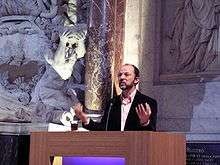Paul Schnabel
| Paul Schnabel | |
|---|---|
 Paul Schnabel during the manifestation of Een Land Een Samenleving in Amsterdam's Nieuwe Kerk in 2006 | |
| Born |
July 17, 1948 Bergen op Zoom, Netherlands |
| Nationality | Dutch |
| Occupation | Sociologist |
Paul Schnabel (born July 17, 1948 in Bergen op Zoom) is a Dutch sociologist and as of 2006 the director of an agency of the Dutch government called Sociaal en Cultureel Planbureau (Netherlands Institute for Social Research), usually abbreviated as SCP (or SCPB).[1] He is also professor at Utrecht University. Since 9 June 2015, he has been a member of the Senate on behalf of Democrats 66 (D66).
Biography
Schnabel grew up in Breda. He studied sociology at Utrecht and Bielefeld Universities. He received his Ph.D. in 1982 for his dissertation on new religious movements and mental health.
Apart from his work for the SCP he has other appointments in several institutions in Dutch society such as the Netherlands Institute for Art History (RKD), and the Scientific Council for Government Policy. He is a columnist to the Dutch newspapers NRC-Handelsblad and Het Financieele Dagblad.[1] As of 2008, he is also the chairperson of the committee that selected the 1,000 texts deemed as "key" of the Dutch and Flemish cultural history for the Digital library for Dutch literature.[2]
Since 2006 De Volkskrant lists him in their top ten of the most influential persons in the Netherlands.[3]
References
- 1 2 "Paul Schnabel". OECD.
- ↑ Somers, Maartje Van abel spel tot Achterhuis: De basisbibliotheek – het Nederlands erfgoed in duizend sleutelteksten in NRC Handelsblad 4 April 2008 section 'Boeken', page 10
- ↑ Wouter de Nooy; Erasmus Universiteit Rotterdam.; Erik Bloem; Eveline Domevscek; Martin Kettelarij (06/10/2007). "VOLKSKRANT TOP 200 2007". de Volkskrant. Retrieved 21 August 2012. Check date values in:
|date=(help)
- Delft, Dirk van Snelle generalist in the NRC Handelsblad 29 July 2006 (Dutch language)
Selected bibliography
- Tussen stigma en charisma: nieuwe religieuze bewegingen en geestelijke volksgezondheid/Between stigma and charisma: new religious movements and mental health Erasmus university Rotterdam, Faculty of Medicine, Ph.D. thesis, ISBN 90-6001-746-3 (Deventer, Van Loghum Slaterus, 1982) available on the internet
- De weerbarstige geestesziekte: naar een nieuwe sociologie van de geestelijke gezondheidszorg, 1995, SUN (with Derksen, Jan)
External links
| Wikimedia Commons has media related to Paul Schnabel. |
| Wikiquote has quotations related to: Paul Schnabel |